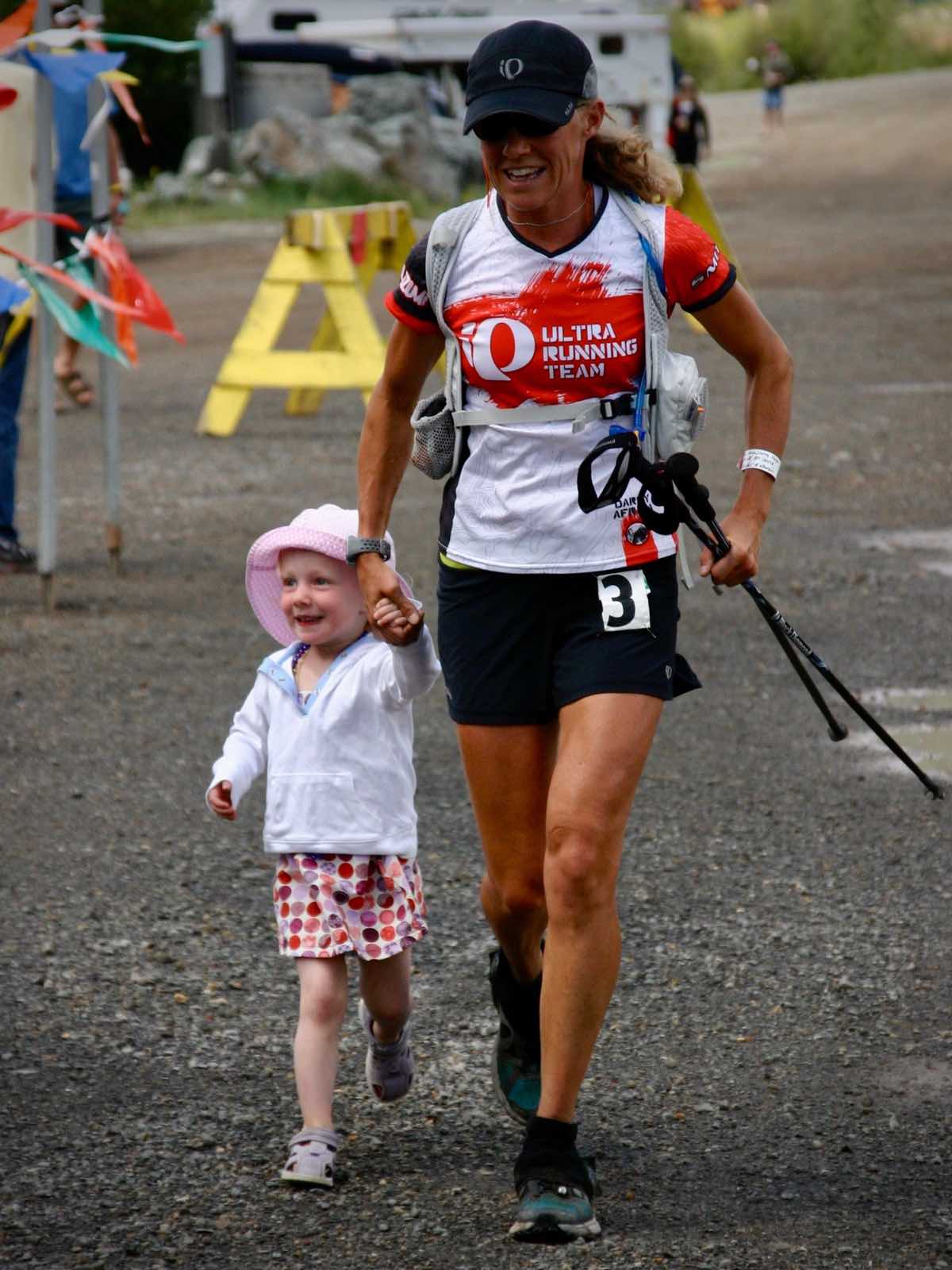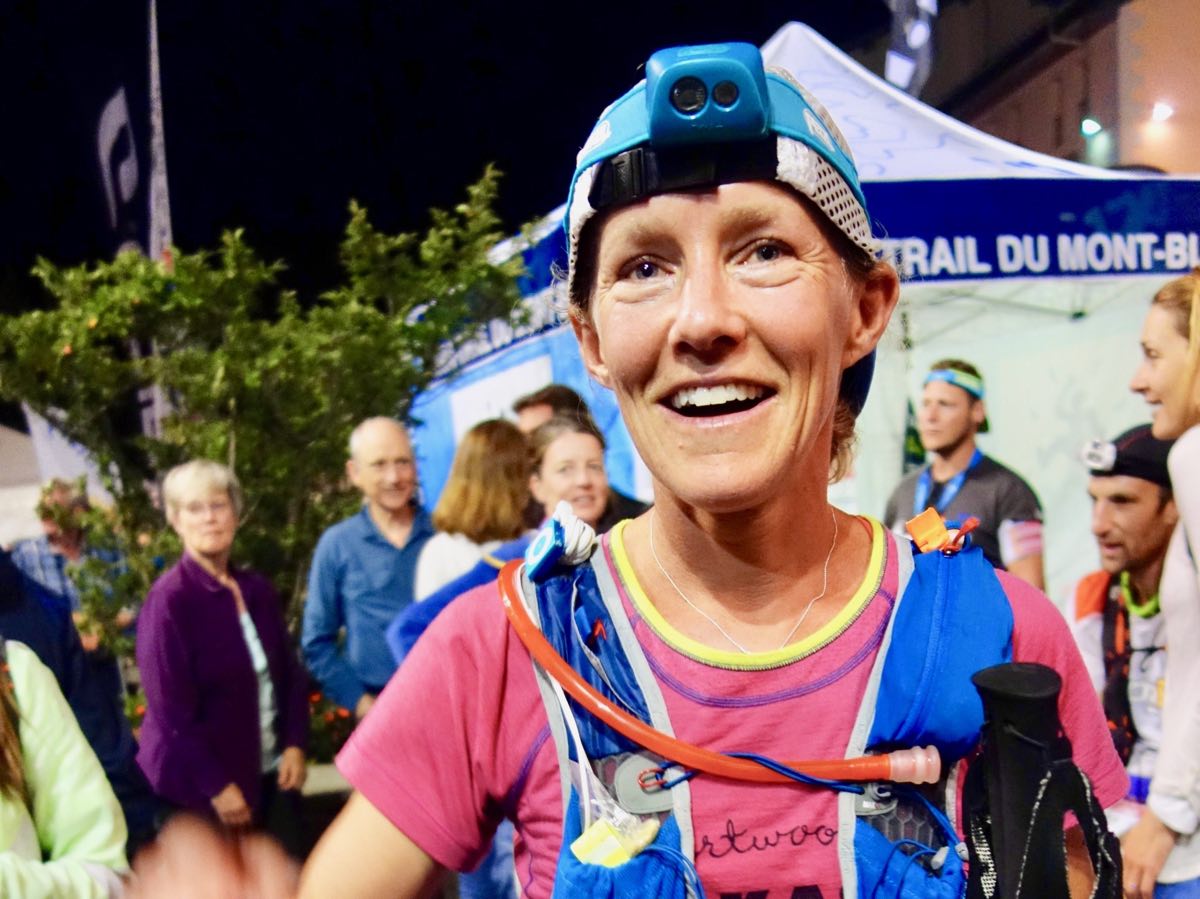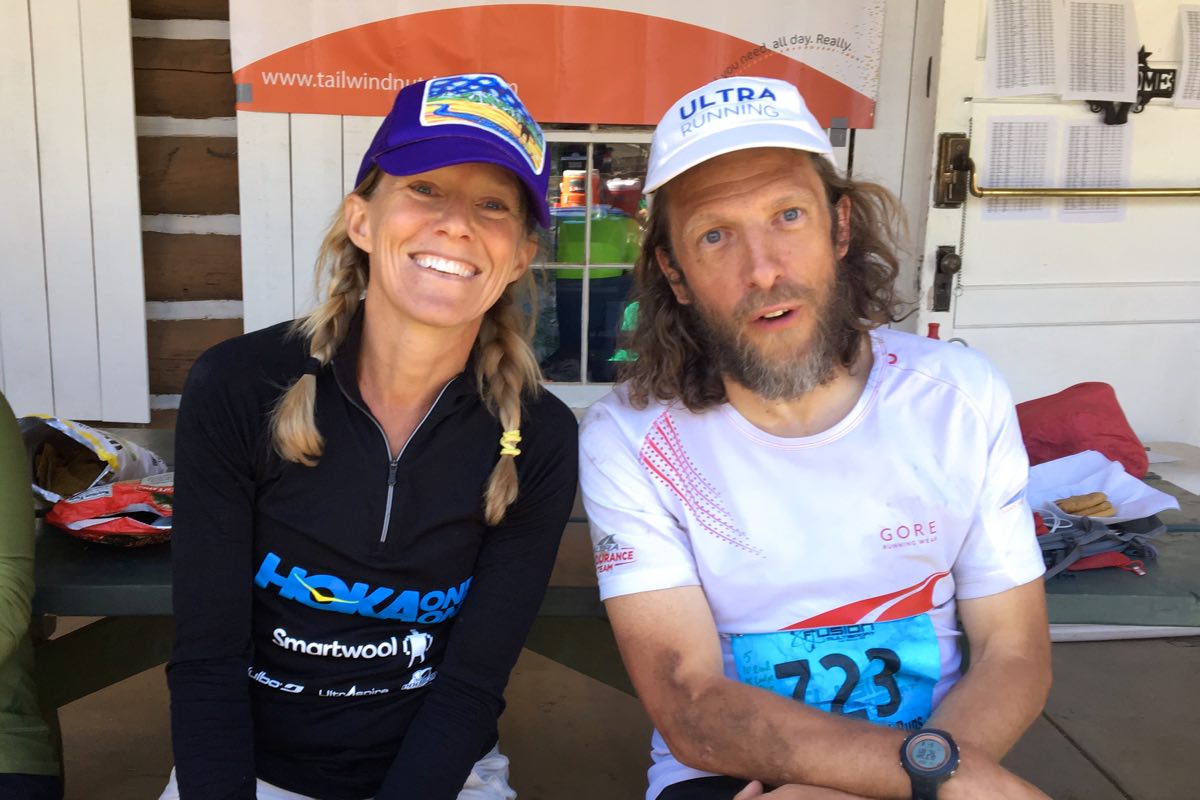‘Age-Old Runners’ is an article series where we explore runners’ performance potential after the age of 45 by interviewing excellent middle-aged runners. Is there still potential to improve? What roles do motivation, mindset, and specific training and recovery techniques play in allowing runners in their mid-40s to mid-60s to continue to excel? To learn more about this series’ goals, check out its introductory article.
Darcy Piceu is 45 years old. (She was thrilled she just made the age cutoff for this series.) She’s run close to 100 ultramarathons and placed top three in most of those. She’s won the Hardrock 100 three times, and placed second four times. Two years ago, she won the Javelina Jundred, the Angeles Crest 100 Mile, the Ronda del Cims, and the HURT 100 Mile. The year before that, at age 42, Darcy set the supported women’s fastest known time on the 221-mile John Muir Trail. She also holds the record for the Rocky Mountain Slam, where you run the Bighorn Trail 100 Mile, the Hardrock 100, the Leadville Trail 100 Mile, and the Wasatch Front 100 Mile all in one season.
The following is a transcript of a phone interview with Darcy. It has been edited for brevity and clarity.
How has getting older impacted your running?
I definitely feel it. I try to operate from that place where age is just a number, and I really do believe that in a lot of ways. I also know that there are changes that I feel. Running feels great some days. And then some days, I think, This is not the way it used to be.
What feels different at 45 years old?
It varies. So much of what I do is up and down mountains, so, in that way, I haven’t beaten myself up on the roads. But I think I’ve really beaten myself up with a lot of vertical and a lot of technical mountain running. Some days, I feel that in my knees. It varies daily whether or not I feel the pain in my knees.

Darcy Piceu taking second at the 2011 Hardrock 100. Her daughter Sophia is running her in. All photos: iRunFar
Does it take you longer to recover from hard efforts than it used to?
I don’t know if I’ve really noticed that. It’s more just not being able to do really long and sustained hard efforts. I can go out for a couple of hours and feel great, but when I go beyond that or in longer races, I really notice that I don’t have the ability to sustain hard effort anymore.
Do you still enjoy racing?
I do. I have such a passion for running, being outdoors, and being on the trails. I still love it just as much as I ever did.
Racing has changed a little bit for me, though. I used to be really focused on these solo efforts. My focus was inward, and I didn’t love to socialize in races. I used to be out on the trails for however many hours alone, and I still do that all the time, but I find that that part has gotten old. I’ve found myself now really wanting to connect with people and the community. I don’t know if that’s related to age.
Why do you think that you continue to race so well?
Last year wasn’t awesome, so I feel self doubt answering, but I think part of staying reasonably healthy all these years is that I don’t overtrain. I don’t log a ton of miles every week, and I think that has really saved me. Also, unlike a lot of ultrarunners that I know now, I never ran in high school. I only started recreationally running at the end of college. So I think my legs are still able to move well. [Author’s Note: Darcy’s running age is 20 years.]
You jumped quickly into ultras once you started running.
Yeah, I did. I think the first true trail race I did was the Breckenridge Crest Marathon [in 2000]. It’s a pretty stout run, so I did kind of throw myself into it a little bit. Lake City, now it’s the San Juan Solstice 50 Mile, was my first 50 miler ever [in 2001]. From the get go, I was always drawn to the mountain trail running races. Leadville was my first 100 miler [in 2002].
Have you done any road racing?
No. To this day, I’ve never run a road marathon. I mean, we do the Boulder Boulder 10k every year, but that doesn’t really count. And now, it’s just tradition to run it with my daughter.
At 45 years old, how do you see your potential as a runner?
I’ve been drawn to pushing the envelope and challenging myself in harder ways. I did Tor des Géants last year, which blew up a little bit in my face. But going for these harder races now… I was supposed to run the Barkley [Marathons] this year. So I find myself thinking: What do I have to lose at this point? I’m just interested in races that I might not have been interested in before. It’s pushing myself even more, but in a different kind of way… a longer, more suffering way. I feel like I’m at a point where I’m thinking: What’s next? What’s the next step? That’s how the John Muir Trail came about. [Author’s Note: Darcy set the FKT on the John Muir Trail in 2017 when she was 42. She ran 222 miles in 3 days, 7 hours, and 57 minutes.] That was my first attempt at anything longer than 100 miles.
Are you looking for ways to replace the excitement and challenge that existed for you in the 100-mile distance and other ultras you’ve run before?
I haven’t really thought about it in that way. Maybe that’s it.
You were supposed to run Hardrock again this year. Do you think you can run a better race there?
I don’t know. I’ve run Hardrock seven times. And my times have been pretty similar every single year. Unfortunately, last year, I trained harder than I had ever. The same goes for Barkley this year. I trained harder for Barkley than anything I’ve ever done, and everything got canceled. So I don’t know. I go back and forth. I have days when I think I can run Hardrock faster, or I want to run it faster. I mean, of course, I always have that drive to run it faster, but whether or not that’s possible… I don’t know.
You think not being able to improve your Hardrock time wouldn’t necessarily reflect your age, but maybe just your ability at that race?
Exactly. I mean, I definitely had years there where I got to the starting line thinking I did not train enough for this. So maybe there’s a part of me that thinks if I really showed up feeling like I did everything I could I trained as hard as I possibly could maybe it would be different.
Will you go back to Tor des Géants?
I’d like to. I’d like to see what I could really do there if I had a good day. I know I can do way better if my body cooperates. And it’s just such a cool course. It’s such a cool race. I learned so much. I feel like you almost need to go and experience it, learn from it, and then go back and try to race it.
When you’re racing, do you ever think about your age?
Yeah, for sure. I do. I think part of it is that the population that is running ultras now has gotten younger, and I definitely notice it. I definitely feel it. I remember when my legs were 25. But I also really strongly believe in our mindset and how that impacts us. So I try not to let [thoughts about my age] creep in.
How many miles a week do you average now?
Well, it’s funny, I’ve never tracked mileage. I have no idea how much I run on a daily basis. I just kind of know my time. I don’t like technology; I don’t even like wearing a watch…. I just like to tune into my body and pay attention…. I signed up for this Strava Smartwool Challenge… and was tracking my mileage for the first time ever on Strava. Idid one of my favorite loops in Boulder, [Colorado where I live], and I always thought it was at least between 10 and 12 miles. But this morning I found out it’s only 8.9 miles. It’s a ton of vertical, but I just thought: Oh my god! It takes me forever to do this loop! I’m trying not to read into this too much. I think that might be part of the reason why I never used anything to track my runs.
Do you dedicate the same amount of time to running as you always have?
Well, during the quarantine, I’m devoting more time to running. But I’ve been pretty consistent from year to year. I mean, I’ve never been one to log high mileage. It would be super rare for me to run a 100-mile week. That’s just not how I train. I focus on time on feet, and I try to do more quality rather than quantity.
How has your speedwork changed?
I don’t really have any designated speedwork days. Again, just going back to listening to my body, if I’m feeling good, I run faster, and if I’m not feeling great, then I run slower.
Do you think back-to-back long runs are valuable training?
Yes. If I’m training for 100 milers or more, I do long back-to-back days in order to train my body to run on tired legs. I’ve always done this. Typically, not more than three days in a row. If I have a three-day weekend when I am solo [without my daughter], I might log more miles.
Have you had many injuries over the past 20 years? Are you injured more frequently now?
Thankfully, nothing that’s really taken me out for any long period of time. I had Achilles tendinitis and plantar fasciitis when I was in the middle of doing one of the Slams–the Rocky Mountain Slam–but I managed to work through it and sort of run through it.
The biggest thing for me over the last five years has been knee pain. I haven’t had any surgeries, thankfully. I just try to manage it by really stretching out my quadriceps and rolling. I use a foam roller more now than I ever have. And that is part of my strength routine, I guess. I do band exercises to make sure I’m strengthening my glutes and my hamstrings and hips. I feel like my knees are really the biggest thing I’ve had to deal with over the last four or five years.
What other injury-prevention work do you do?
I try to incorporate yoga. I don’t do it as much as I used to… maybe once a week now. And I do basic strength work. I focus on core work… planks and basic things like that. And I do some mild strength work. I don’t have a set routine. I don’t have a coach, or a personal trainer or anything like that. There’s just not enough time in the day to get in everything. I feel lucky that I’m still getting in my runs most every day.
I also pay a little bit more attention now to my diet. I always maintained a pretty healthy diet. And I haven’t eaten meat since I was 17 years old, but I do eat sustainable-caught fish and eggs and dairy. I’ve just noticed that my gut is more sensitive, and I can’t eat everything that I want to or used to eat. I will occasionally cut out sweets, alcohol, and dairy. I feel so much better when I do.
What in particular distresses you about getting older as a runner?
There are definitely times where I feel like I’m never going to be the runner I was when 33 or 30. And that it’s hard to accept. It’s hard. There’s no other way to say it.
Would you have changed anything about how you trained or the races you chose to run?
No, not at all. I really followed my heart in most of the races I’ve chosen. I sought after the races that I wanted to do, and the courses I wanted to see and experience. I’m really glad that I did it that way. I wasn’t focused on times. I wasn’t focused on the numbers. I just wanted to go out and really enjoy myself in the mountains. And I feel like I did that in my career.
What training mistakes do you see younger runners making?
Logging too many miles in training, and getting injured early. Also, racing the fastest races all in one year and then blowing up. That’s way oversimplified, but I’ve seen such amazing talent come onto the running scene over the past five to seven years, and then they are gone, or constantly injured.
Training specifics
- Weekly running volume: Ten to 20 hours per week
- Strength training: Mostly core work a couple of times a week
- Off-season: Late fall and early winter when she skis instead
- Sleep: Eight to 10 hours a night
- Race nutrition: First Endurance EFS, Honey Stinger chews and waffles, whatever real food looks good in the aid stations (chips, fruit, potatoes dipped in salt, and more), and Coke. Vegan ramen soup in the evenings and avocado tortilla wraps during the day if she has a crew.
- Recovery: No running for two or three days following a race. Then slow runs with no agenda, just when she feels like she wants to move. Massage one to two weeks after a race.
Three factors Darcy attributes her running performance to:
- A deep love of the sport
- Not overtraining
- Being consistent
Call for Comments
Calling all Darcy Piceu comments! Leave a comment to share yours!


